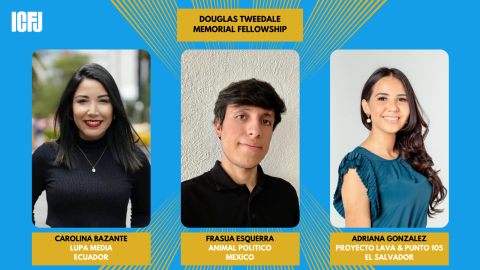This announcement was edited on May 9, 2024, to reflect updates to the fellowship for this year.

Fact checkers from Mexico and Ecuador and a media founder from El Salvador are ICFJ’s newest Douglas Tweedale Memorial fellows.
Through the fellowship, Carolina Bazante, of Lupa Media in Ecuador, Frasua Esquerra of Animal Político in Mexico, and Adriana Gonzalez of Proyecto Lava and Punto 105 in El Salvador will travel to the U.S. for training that deepens their skills in the areas of fact-checking and fighting disinformation. They also will be placed in U.S. newsrooms to learn strategies they can bring back to their home countries to share with colleagues and use in their own work.
The Douglas Tweedale Memorial fellowship has supported numerous journalists from Latin America over the years in areas such as environmental reporting, immigration and mental health, among others. Due to the COVID-19 pandemic, the 2021 program was modified to serve journalists virtually. This year, the long-running fellowship returns to in-person activities.
The program began in September 2023 with a virtual training for journalists across the region covering fact-checking best practices and tips for fighting disinformation. Around 50 participants joined for the first phase of the program. For this next phase in October-November 2024, Bazante and Esquerra will have the opportunity to enhance their knowledge through practical training sessions and exchange ideas through a U.S. media embedment. Gonzalez will conduct her newsroom embedment in 2025.
"It is vital to support the fight against disinformation in Latin America,” said Alison Grausam, the ICFJ program director overseeing the program. “This year's Tweedale Fellowship comes at a crucial time, with the region awash in elections and political activity, making the role of journalists in providing quality, fact-based information to their communities all the more important.”
Carolina Bazante
Bazante is an Ecuadorian journalist specialized in fact-checking, with 10 years of experience in mass media as an editor and reporter. Her work has been published across various mediums including press, television, radio, and digital platforms in Latin America, the U.S. and Spain. In 2023, Bazante also founded Lupa Media — an independent organization specialized in fact-checking and media literacy.
During her upcoming fellowship, Bazante is eager to acquire advanced strategies and techniques for addressing misinformation, including insights into how U.S. media approaches the challenges posed by artificial intelligence and deepfakes. She plans to directly apply these learnings to enhance Lupa Media. She intends to leverage her U.S. experience to enrich media education campaigns conducted by Lupa Media, sharing insights and best practices with journalists, students, and civil society leaders. Bazante is particularly focused on strengthening her skills in information verification, data analysis, and multimedia content verification. She also seeks to develop expertise in creating impactful awareness campaigns that emphasize the importance of fact-checking and trustworthy news sources.
Frasua Esquerra
Esquerra is a fact-checker for El Sabueso, a verification section of the Mexican media outlet, Animal Político. He previously coordinated the fact-checking department at Notimex. Esquerra received his master’s degree in political science from El Colegio de Mexico.
Esquerra looks forward to gaining more knowledge in the field of disinformation from different approaches and perspectives. He is eager to share his learnings and experiences from the fellowship with his team at El Sabueso and with other Mexican journalists who would be interested in this work.
Adriana Gonzalez
Gonzalez is the founder and director of Proyecto Lava, a solutions journalism initiative in Central America. She is also a broadcaster for Radio Punto 105. Gonzalez has worked for various media organizations in El Salvador, including FocosTV, Diario Co Latino and Teleprensa. Gonzalez is accredited as a trainer by the Solutions Journalism Network and has held fellowships with Fundación Gabo and ITP Media Sida.
Gonzalez wants to integrate fact-checking methods with current initiatives at Proyecto Lava. Through the fellowship, she hopes to learn and see how disinformation is fought from a global perspective. Gonzalez seeks new ways to enhance the impact of journalism and engage with audiences to address misinformation. The fellowship will provide her with support to build upon existing projects while gaining practical experience in the fact-checking and misinformation fields for further innovation.
This article was edited on May 9, 2024, to include Carolina Bazante as one of the newest Douglas Tweedale Fellows and reflect that Adriana Gonzalez will conduct the in-person part of her fellowship in 2025.